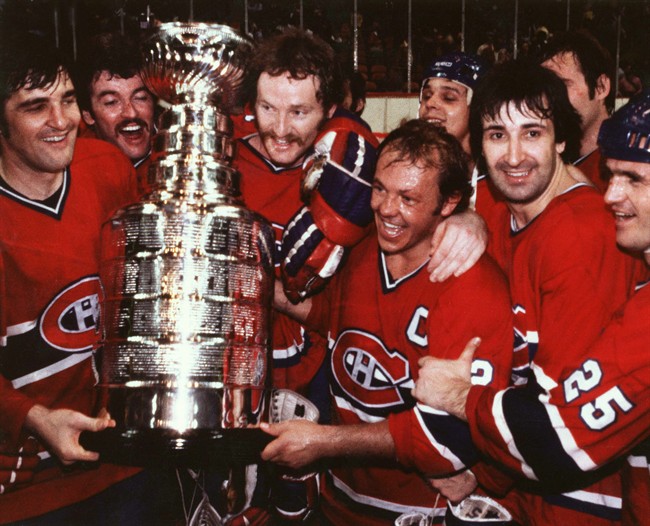He won eight Stanley Cups as a player, two as a general manager, and his list of individual awards — from the Conn Smythe Trophy to the Hockey Hall of Fame to the Order of Canada — is equally impressive, but Serge Savard’s story has only now become the subject of a comprehensive biography.

Savard, a member of the legendary Montreal Canadiens squads in the late 1960s and 1970s, is the subject of a new book, Serge Savard: Forever Canadien — which also covers the last two seasons of his career with the Winnipeg Jets.
The defenceman, nicknamed The Senator during his playing career, said he’d been asked about participating in a biography in the past but had never committed.
“I was asked many times in the last 10 years to do that, and I guess I always turned it down,” Savard told 680 CJOB.
“I was not prepared. One day, my son said, ‘Dad, if you don’t do it, I’ll do it.’ So that was the click there. I decided to do it. It’s a lot of work, it’s a lot of fun.”
Savard collaborated with author Phillippe Cantin to revisit his life’s story — not only the championship glory but his roots in small-town northern Quebec.

Get breaking National news
“You have to dig way back to your youth,” he said. “I’m from a place with similar weather to Winnipeg. It’s 400 miles northwest of Montreal — a very small community, and I really enjoyed (going back).
Savard, whose pro career began in 1966, is from an era when rural communities in Ontario, Quebec and the prairies tended to be a greater pipeline to the NHL, in many cases, than the big cities, something he said isn’t the case today.

“Everybody has indoor arenas with artificial ice. We didn’t have that, and up north, the winter was probably one month longer than in the Montreal area,” he said.
“Some years we didn’t have ice rinks — we did it on our own. We skated on ponds. It’s hard to believe (now), but the north produced many, many more hockey players than the big centres.”
Named one of the NHL’s 100 greatest players of all time in 2017, Savard’s professional career was nothing less than stellar, including a string of four championships in a row on legendary Canadiens squads.
With the current league, its salary structure, and the way its teams are managed, he said it’s unlikely we’ll ever see dynasties of that type in the sport again.
“I don’t think you could duplicate a team like that,” he said. “If you look at our team, one year we lost (only) eight games. The following year we lost 10 games, and more than half of the team are in the Hockey Hall of Fame.
“I don’t think you could buy that type of team now, and it’s too bad.”
After his star-studded Habs career, Savard said he made the decision to retire in 1981, only to get persistent calls from former teammate-turned-Jets GM John Ferguson, asking him to reconsider and to join the fledgling Winnipeg franchise, which desperately needed the help.
“I remember the Jets lost 15-2 or something like that in Minnesota, and he called me in the middle of the night and said, ‘You have to come.’
“I was not really ready to go, but my wife was next to me and she said, ‘I can pack my bags in 24 hours if you really want to’… and that did it.”
Savard said his brief sojourn in Winnipeg made him some lifelong friends, including the late Jets legend Dale Hawerchuk, who died of cancer earlier this year.
“Dale Hawerchuk was the captain at 18; he bought a house right next to mine on Lancaster Street. We were family.
“Just before I printed (the book), Dale called me. I knew he was very sick. He said he just wanted to say hello… and he says, “I’m going.’
“I don’t know if you ever had a call like that, but it’s the toughest call I’ve ever had in my life.”













Comments